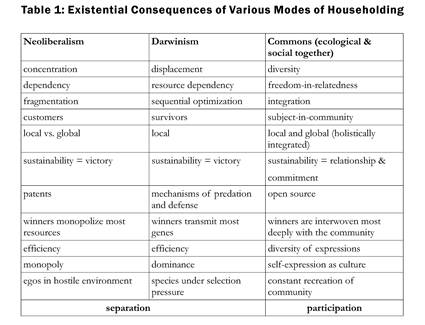Commons
This note is about multispecies commons.
Commons in History
Including a chapter on ecological commons:
Wall, Derek. The Commons in History: Culture, Conflict, and Ecology. Cambridge, MA: MIT Press, 2014.
Urban Commons
Derya Özkan and Güldem Baykal Büyüksarac, eds., Commoning the City: Empirical Perspectives on Urban Ecology, Economics and Ethics, Space, Materiality and the Normative (Abingdon: Routledge, 2020).
For the introduction, including considerations of more-than-human commons, see:
David Bollier, Think Like a Commoner: A Short Introduction to the Life of the Commons (Gabriola Island: New Society Publishers, 2014).
Beyond Human
Kinetic or metabolic communism or commoning.
Nail, Thomas. Theory of the Earth. Stanford: Stanford University Press, 2021.
On nature following the rules of the commons, ascertain
Weber, Andreas. ‘The Economy of Wastefulness: The Biology of the Commons’. In The Wealth of the Commons: A World Beyond Market and State, edited by David Bollier and Silke Helfrich. Amherst: Levellers Press, 2012.

History of evolution is characterised by the growth of freedom, where the agents are autonomous subjects bound together in mutual dependence.
The organism is as a subject who interprets external stimuli rather than being governed by them. Organisms negotiate their existence with others under conditions of limited competition and “weak causality.”
Freedom evolves. So does the complexity and depth of relationships.
In the natural world there is no (or no dependence on):
- Efficiency
- Growth
- Competition
- Scarcity
- Property

Three types of relationships:
- property
- ownership
- possession
Herrmann-Pillath, Carsten. ‘The Universal Commons: An Economic Theory of Ecosystem Ownership’. Ecological Economics 208 (2023): 107822. https://doi.org/10/gshcd3.
References
Amin, Ash, and Philip Howell, eds. Releasing the Commons: Rethinking the Futures of the Commons. London: Routledge, 2016.
Baviskar, Amita. Uncivil City: Ecology, Equity and the Commons in Delhi. New Delhi: SAGE, 2020.
Bolier, David. Think like a Commoner: A Short Introduction to the Life of the Commons. Gabriola Island: New Society Publishers, 2014.
Bollier, David, and Silke Helfrich. Free, Fair, and Alive: The Insurgent Power of the Commons. New Society Publishers, 2019.
Bollier, David, and Silke Helfrich, eds. The Wealth of the Commons: A World beyond Market and State. Amherst: Levellers Press, 2012.
Borch, Christian, and Martin Kornberger, eds. Urban Commons: Rethinking the City. Abingdon: Routledge, 2015.
Bresnihan, Patrick. Transforming the Fisheries: Neoliberalism, Nature, and the Commons. Lincoln: University of Nebraska Press, 2016.
Buck, Susan J. The Global Commons: An Introduction. Washington, US: Island Press, 1998.
García-López, Gustavo A., Ursula Lang, and Neera Singh. “Commons, Commoning and Co-Becoming: Nurturing Life-in-Common and Post-Capitalist Futures (an Introduction to the Theme Issue).” Environment and Planning E: Nature and Space 4, no. 4 (2021): 1199–216. https://doi.org/10/g9zr64.
Gibson, Johanna. Owned, an Ethological Jurisprudence of Property: From the Cave to the Commons. London: Routledge, 2020.
Grear, Anna. “Resisting Anthropocene Neoliberalism: Towards New Materialist Commoning?” In The Great Awakening: New Modes of Life amidst Capitalist Ruins, edited by Anna Grear and David Bollier, 317–56. Santa Barbara: Punctum Books, 2020.
Mbembe, Achille. 2023. La Communauté Terrestre. La Découverte.
O’Brien, Daniel T. The Urban Commons: How Data and Technology Can Rebuild Our Communities. Cambridge, MA: Harvard University Press, 2018.
Ostrom, Elinor. Governing the Commons: The Evolution of Institutions for Collective Action. 1990; Cambridge: Cambridge University Press, 2015.
Nightingale, Andrea J. “Commoning for Inclusion? Commons, Exclusion, Property and Socio-Natural Becomings.” International Journal of the Commons 13, no. 1 (May 2019): 16–35. https://doi.org/10/ghm8vg.
Pasquinelli, Matteo. Animal Spirits: A Bestiary of the Commons. Rotterdam: NAI Publishers, 2008.
Sanchez, Jose. Architecture for the Commons: Participatory Systems in the Age of Platforms. New York: Routledge, 2020.
Standing, Guy. The Blue Commons: Rescuing the Economy of the Sea. A Pelican Book. London: Pelican, 2022.
Stavrides, Stavros. Common Space: The City as Commons. In Common. London: Zed Books, 2016.
Vivero-Pol, Jose Luis, Tomaso Ferrando, Olivier de Schutter, and Ugo Mattei, eds. Routledge Handbook of Food as a Commons. London: Routledge, 2019.
Wall, Derek. The Commons in History: Culture, Conflict, and Ecology. Cambridge, MA: MIT Press, 2014.
Watkins, Mary. Mutual Accompaniment and the Creation of the Commons. New Haven: Yale University Press, 2019.
Weber, Andreas. “The Economy of Wastefulness: The Biology of the Commons.” In The Wealth of the Commons: A World Beyond Market and State, edited by David Bollier and Silke Helfrich. Amherst: Levellers Press, 2012.
Weber, Andreas. Sharing Life: The Ecopolitics of Reciprocity. India: Heinrich-Böll-Stiftung, 2020.
Weston, Burns H., and David Bollier. Green Governance: Ecological Survival, Human Rights, and the Law of the Commons. Cambridge: Cambridge University Press, 2013.
Backlinks